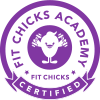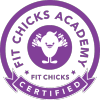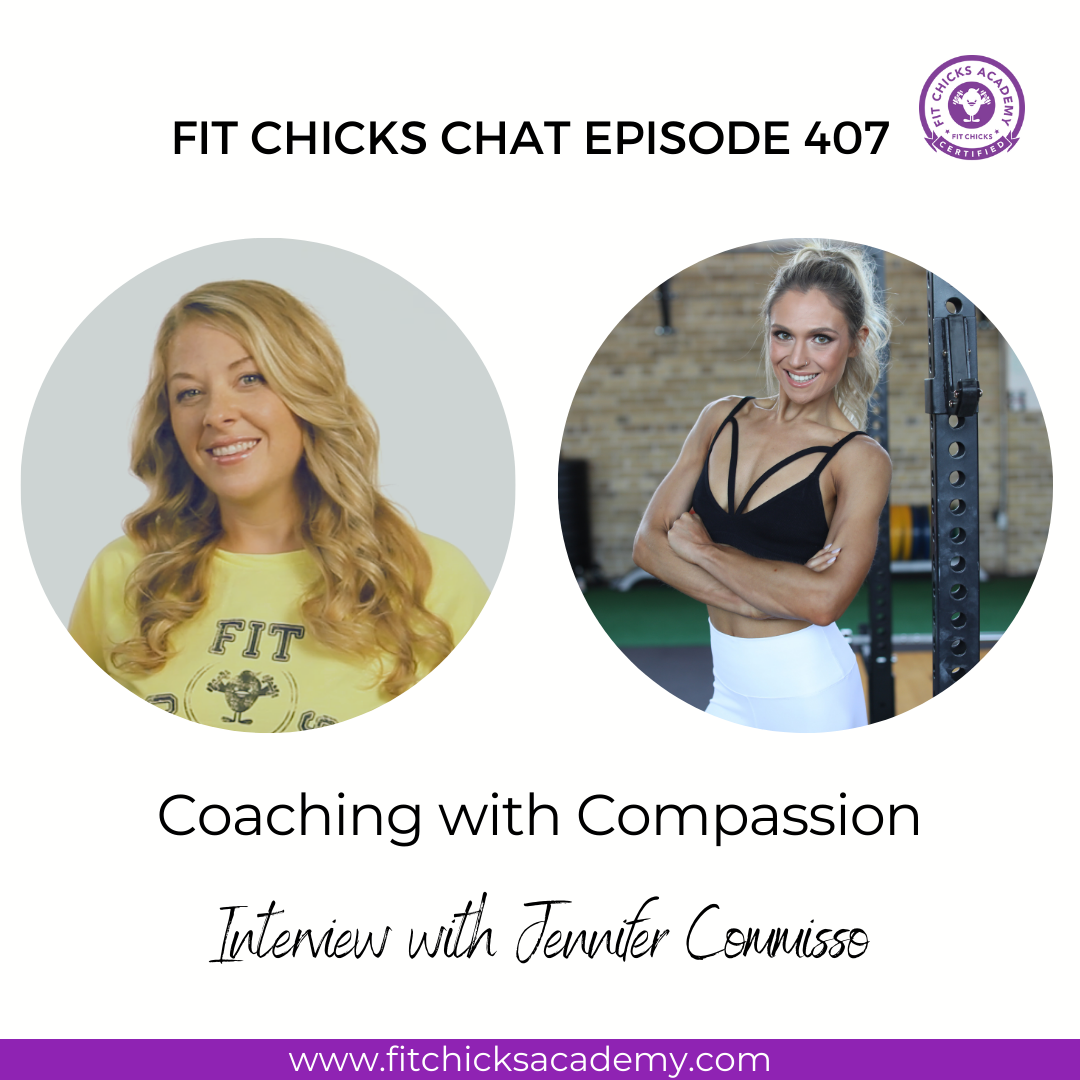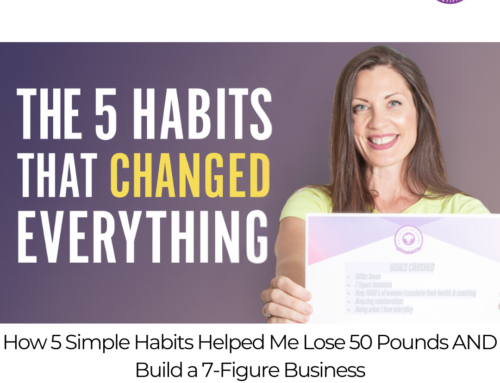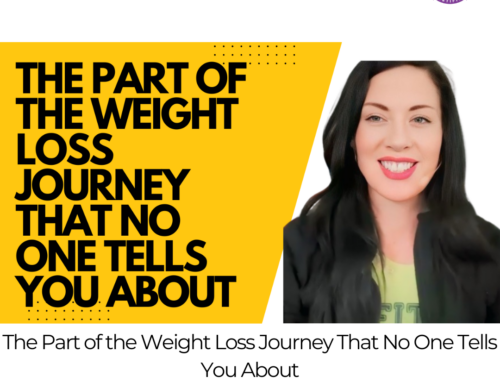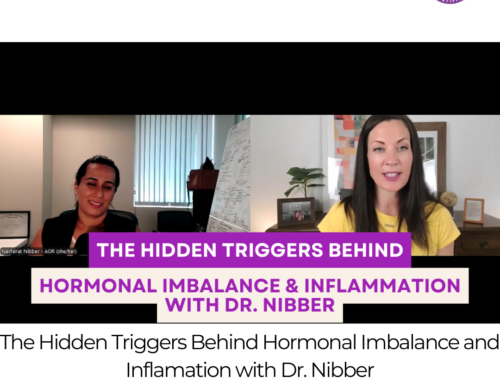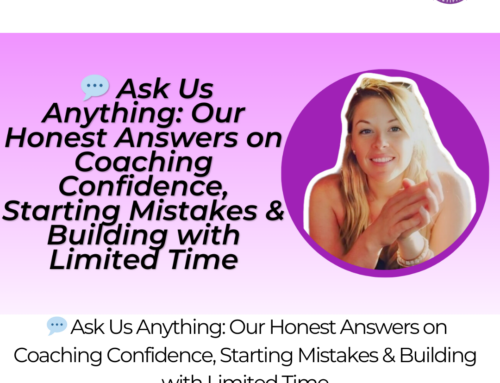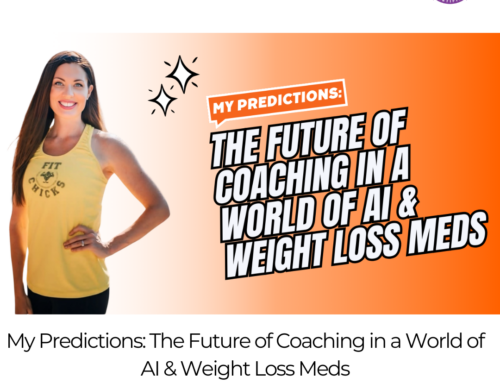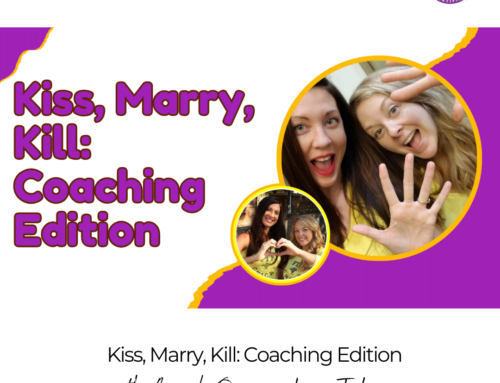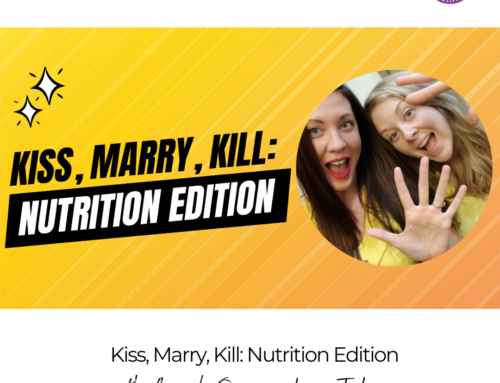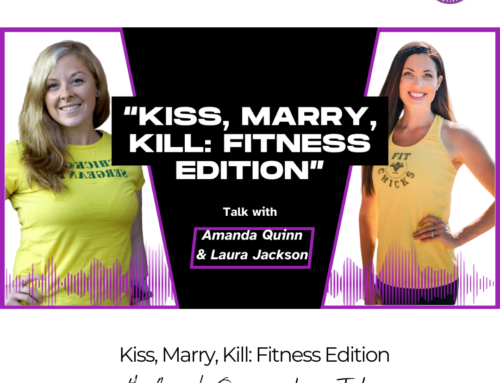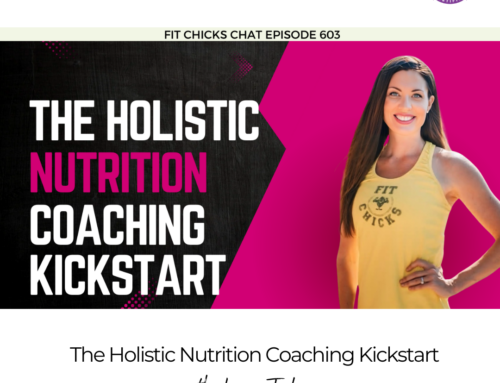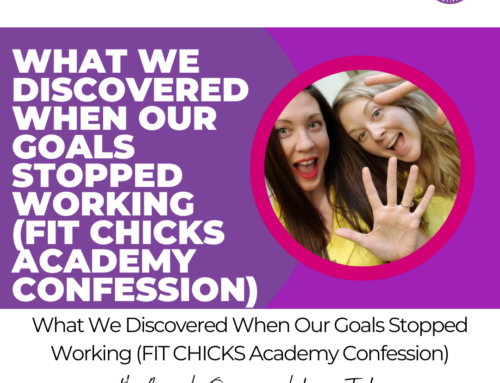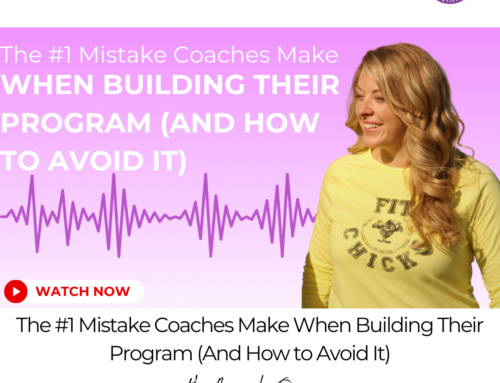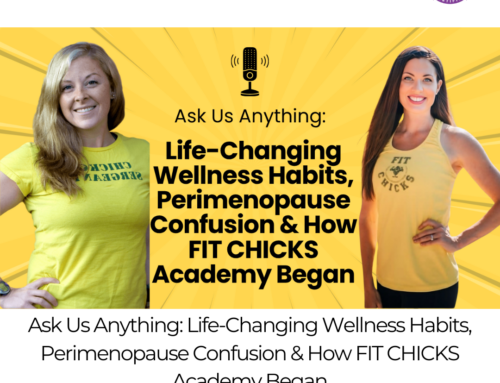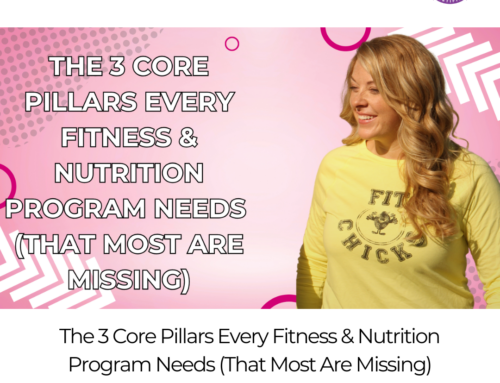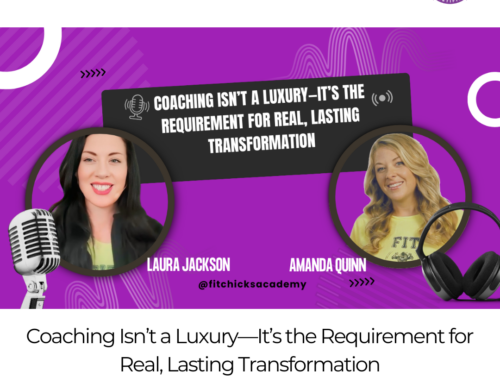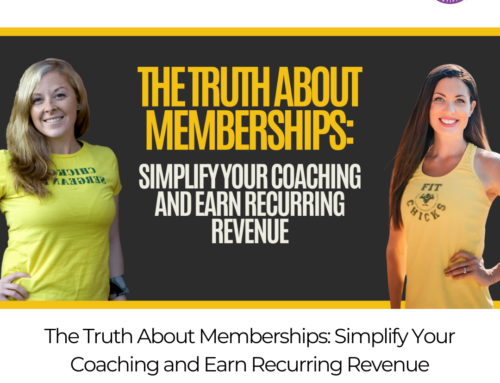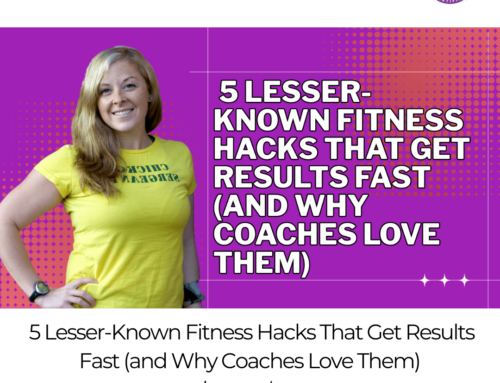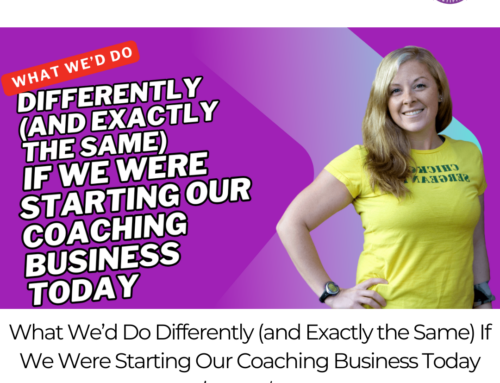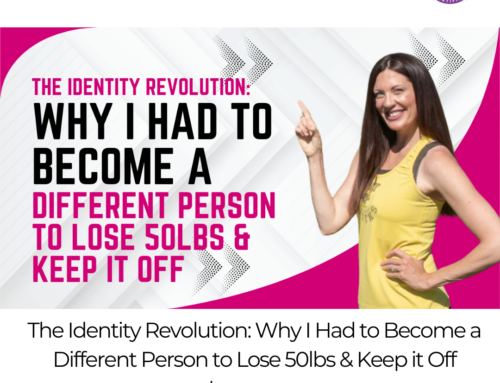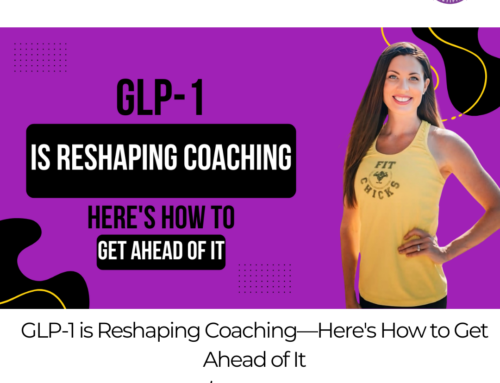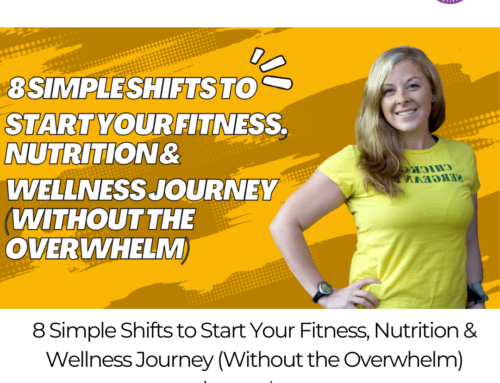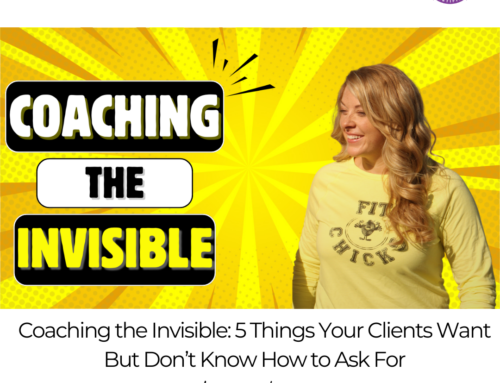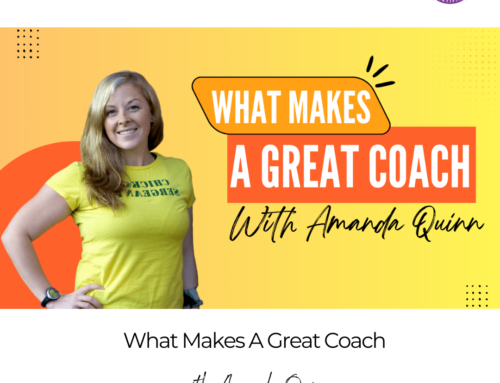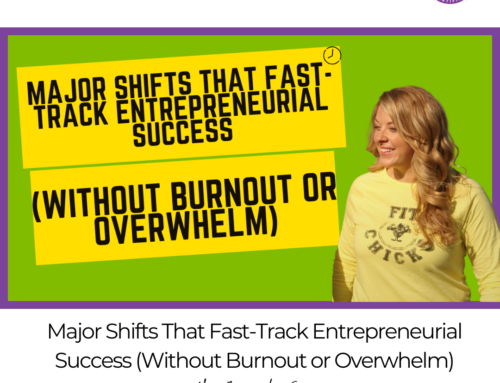The one thing that makes an amazing coach is to lead with compassion and to show this not only to your clients but also to yourself.
Today we chat with Fitness and Nutrition Expert graduate and owner of Jennii Rose Fit coaching to learn more about how she leads her clients down a path of success and how this path has also been shaped for herself.
In this interview Jenni shares details of her own health journey including her own struggles and how that has helped shape her the be the incredible coach she is. She also shares how she has pivoted within her life and business and what led to her success today.
Do you love health and fitness and are ready to make impact and income? Our FIT CHICKS Academy Fitness & Nutrition Expert Coaching Certification opens for enrollment this week so join us on Thursday at 12pm for our live info session to learn how to get certified and start build an incredible fitness business of your dreams at www.fitchicksacademy.com/infosession
CLICK ON THE PLAYER BELOW TO LISTEN TO THE FULL EPISODE
Bio
Fit Chicks Academy Alumni and Certified Holistic Nutritionist Jennifer, is the face behind JenniiRose FIT 1:1 Online Coaching for Women. After 4 years of working as a group fitness bootcamp instructor and personal trainer, Jennifer transitioned herself into the online coaching world and launched her own practise during the height of the pandemic. Since then, Jennifer has coached a variety of women, helping them to transform their bodies from the inside out!
Jennifer prides herself on creating customized programs that addresses both physical and mental wellness; as she has personally undergone her own weight loss transformation, as well as struggled with disordered eating, body dysmorphia and hormonal issues along the way. Jennifer’s top priority as a coach is to educate her clients so that they can achieve their goals, sustain them for the long haul, and find their balance.
Jennifer strives to provide a supportive and inspiring atmosphere for all women at JenniiRose FIT Coaching, so that they realize anything is possible with consistency, patience, self-compassion, and perseverance.
CONTACT INFO
Website: www.jenniirosefit.com
IG: @jenniirosefit
FIT CHICKS PODCAST PROMO
Apply to work with me via the link below and mention “Fit Chicks Podcast” in your application and receive $15% off my all 12 week coaching packages when you pay in full.
Video Transcript
Amanda Quinn (00:02):
Hello everyone! And welcome to FIT CHICKS chat. My name is Amanda Quinn and on today’s podcast, I have a very special guest joining us today. I have Jennifer Commisso. I said it right? Okay. Hi, Jennifer. How are you today?
Jennifer Commisso (00:15):
I’m great. Thanks. How are you?
Amanda Quinn (00:17):
I’m so good. And I’m so honored to have you here. I mean, you and I have had a connection for quite a few years. You are a graduate of our Fitness and Nutrition Expert program, but on top of that, you have built this incredible business that I’ve seen kind of over the years, just flourish and also change in transition. And that’s really what I wanted to bring you on here today to talk about is the idea behind what you have created now and how that has transitioned. Because I think that a lot of times, coaches or even clients, they feel like they have to stick to a plan because that’s the plan. And would you say that that happens often? Like you have even clients that feel like, well, no, this is what I do. And so I’ve got to keep doing it. Do you run into that?
Jennifer Commisso (00:59):
100%! I get a lot of clients who, you know, start off, let’s say with a certain type of training style or even just, certain, you know, calories that they’ve been on. And as soon as I give them a switch, they get a little bit apprehensive because they’re like, well, this is not what I’m used to. And you know, every coach and every trainer is gonna have a different style. But sometimes, you know, you’re on a different journey as you go through your health and fitness journey. So it’s okay to have it changed and to fluctuate and to kind of go with the ebbs and flows of, uh, of life. Really.
Amanda Quinn (01:30):
And I, I agree with that. And I know Laura and I, we talk about that a lot in our academy, we talk about the idea behind like, your business can grow as you grow and your coaching style can change as you change. And as your life changes, I know even when we look back at our story, it’s like we started with a bootcamp program. We transitioned it to an at home program, an online program of retreats. And then from there we developed our chicks academy and now are certifying other women to then be able to do those things. And it’s such a, it’s such a like different transition from start to finish and never did we know that that was going to happen. Would you mind sharing though? Cause offline, we were just chatting and I thought it was so fascinating to hear. Would you mind sharing with our listeners a little bit more about your story where you started when you graduated as a fitness nutrition expert, you started off with bootcamp programs, but then you developed it into what it is today and I’d love for you to be able to share that out.
Jennifer Commisso (02:21):
Yeah, for sure. So when I first, I guess graduated from the FIT CHICKS academy, I think it was maybe like a few weeks afterwards. There was this job posting in my area at this local bootcamp place. And at first I was so nervous and I was like, I don’t know, like I have like no experience. I had never really trained anybody in person. I was an avid gym goer myself, but I was never a trainer other than, you know, working with FIT CHICKS academy. And I always remember, you know, your message of, um, you know, the imposter syndrome and, you know, we were just as, um, allowed to put our feet into this industry, even if we just don’t have that much experience because you will get experienced as grow. And I’ve totally learned that, you know, throughout, you know, my, my, I guess my career, um, so I had applied for this job at a bootcamp place and I was working there for quite some time.
Jennifer Commisso (03:09):
I want to say, three about three years. And it was an all womens bootcamp facility. And, you know, it was that high energy go, go, go style. And, um, you know, it was, it was great. I learned a lot from it. Um, you know, I was transforming my body as well. Um, I had gone to do a fitness competition during that time too, but it was a lot of stress on my body and I don’t think I truly realized that until, you know, afterwards, um, you know, you kind of just when you’re in it, you kind of just think, yeah, I’m fine. I’m good. You know, this is fitness quote unquote, like this is the way it’s supposed to be. It’s supposed to be that go hard. Uh, no days off, you know, work yourself to the bone. Like it’s supposed to be this way.
Jennifer Commisso (03:48):
Right. So, um, you know, the real, I think transition for me is I, I always wanted to start my own business. Um, and because I was working under somebody else, I was comfortable. I was, you know, I was okay. I was getting, uh, an income and I had hours and I had built a really good rapport with a lot of clients, um, in my community. And then, you know, when COVID happened, we had to shut down. And that was kind of just like a little bit of a reflection point for me. And I’m sure a lot of people went through that when that first initial lockdown happened. Um, it was, I was reflecting and I thought, you know, now is a really great time for me to kind of unplug and really focus on what’s going to bring me, you know, happiness in my journey, because as I was going through the motions of teaching these bootcamp classes, and I also did personal training on the side as well, um, I realized that a lot of my clients, yeah, they did the workout portion, but you know, the nutrition portion was always lacking.
Jennifer Commisso (04:42):
I only saw them for maybe one hour a week, maybe a few times a week. And there were some changes, but for the Mo mat, the vast majority of people, they weren’t able to make those, you know, lifelong changes. Um, and it all had to do with mostly older, their diet, their lifestyle, their choices that they were making outside of the gym. So for me, I felt like, you know, shifting my business towards more of a one-on-one direction might be a little bit more beneficial. Um, and at the same time around when this was all happening, I actually had graduated from, um, the holistic nutrition school at the Edison Institute. So I had that under my belt as well. So I really wanted to focus more on that one-on-one aspect. Um, and I said, you know, I can do that too, but I can also still do the virtual stuff of the, you know, bootcamp style training on the side, because I had a lot of clients who really wanted to follow me and wanted to, you know, liked my training style.
Jennifer Commisso (05:38):
And again, it was that hardcore, you know, no days off hit type of style workouts, um, total body type of thing. So I was doing that virtually, which was really hard at the beginning of, you know, COVID, I wasn’t really tech savvy. Um, so I was doing first, I started on Instagram lives and then I did, uh, on my website, I bought a subscription to put all these videos on my website and, you know, it was uploading videos every other day. So it was creating some really good content and a library. And I was doing that for quite some time. And then, um, this past year in March, uh, I had actually fractured my wrist, um, going snowboarding for the first and the last time. Um, so I went to my doctor obviously and, you know, he said, okay, you know, you fractured your wrist.
Jennifer Commisso (06:25):
Um, but I also, at the same time, um, had disclosed to him that I wasn’t menstruating and that was happening for quite some time. Um, I had an IUD inserted about three years ago and six months prior to the, um, fracture injury. I had it removed, but I still was not cycling at all. I didn’t get any period. And my doctor was a little bit concerned, you know, having the link to, you know, me getting a fracture and me not getting a period, let’s kind of dive deeper into the hormones, see what’s happening, see what’s going on. Um, and sure enough, my estrogen levels were extremely, extremely low. Um, you know, that obviously, you know, the estrogen and the calcium wasn’t getting to the bone because of the estrogen. So my bones were weak despite, you know, exercising all these years. Um, so that really, you know, I had to reflect on that as well because my doctor said, you know, no exercise, no high intensity, no cardio, no anything.
Jennifer Commisso (07:19):
And, you know, you’re talking to somebody who’s basically spent the last like four or five years of their lives, just dedicating themselves to that. Um, so it was really hard for me. Um, and I didn’t want to let my clients down who were in that virtual class space, but I had to, you know, take a step back and think about my health first as well. So my original plan was to keep doing the virtual stuff, the, you know, the class type style stuff, but I had to stop that just due to the fracture due to the, you know, information about the hormones. Um, and I basically said to myself, you know what, I think that my, my journey is changing. And I think that I want to share my journey, um, and how it’s changing with my clients who might be going through, you know, the same thing and connect with them more on that one-on-one level, take that deeper dive maybe into their hormones, into their gut issues, into, you know, uh, their stress levels because it’s all interconnected and it’s all related.
Jennifer Commisso (08:15):
So that’s why I transitioned to that. You know, one-on-one coaching style where, you know, we talk about, you know, obviously training, we talk about nutrition. We also talk about mental health. Um, you know, I’ve struggled with disordered eating patterns, um, for years, which is one of the root causes as to, you know, why my estrogen is so low for years, I was, you know, overtraining undereating not, um, allowing my body to recover. So I find that now I’m speaking to a lot of women who actually go through the same things and, you know, it’s that whole diet culture that we’ve been exposed to. So that’s kind of where I’m at right now.
Amanda Quinn (08:52):
I love that though. And I love that it was just this, it was really taking an introspective look at like, where am I at in my life? What is it that I need in my life to take better care of myself? And how can I then share that with other people and still be a leader for the people that need my help, right. When it comes to health and fitness, that’s really what we’re doing is we’re stepping into leadership roles to help people with their health and wellbeing, to live happier and happier and healthier lives. And so I love that you were able to do that, not just for your clients, but also for yourself, which I think is the key. And I think for anyone listening, who is a coach, or who’s considered being a coach, becoming a coach or someone who is just really into health and fitness, or just starting, even on their journey, like anyone really that’s listening, it’s like take a step back and look at like, is what I’m doing conducive to the goals that I want, but also to my lifestyle that I want. Cause I think that those two things go hand in hand and I think a lot of people don’t consider that.
Jennifer Commisso (09:49):
Yeah, 100%. And I think that, you know, it’s okay to not do the, you know, the norm, um, you know, to branch out and do what you find works best for you. Because I always say to all my clients, like, you know, if you absolutely love, you know, the group fitness atmosphere, you know, for me, I, I was teaching it, but I did my own workouts and I loved the more like strength training, heavy lifting type of stuff. Um, so for me, it didn’t even make sense to continue to do that, you know, bootcamp style, like high intensity class group style training. Cause I wasn’t even doing that myself. Um, you know, so I think that it’s okay. Like if you do enjoy that type of solid training, don’t not get, I’m sure there’s a lot of great benefits from it. And I’ve seen people get great benefits from it, but sometimes we do have to know when to scale back when to push forward. And that’s why I find that even just as a coach, uh, guiding my client clients to kind of navigate, okay, where should I kind of go next? And what should I do next? What’s going to serve my body at this moment in this type of time of my life. Um, you know, because sometimes, you know, we might have a goal of weight loss, but sometimes we have to address maybe some more internal issues first, maybe some stress management first. So it’s okay to kind of have a different journey as you go
Amanda Quinn (11:04):
For sure. And I love that the programming that you’re offering now really does address the mind body and um, like the mind and body connection, right? Like the fitness, the nutrition and the wellness component and the mindset components, because they really do go hand in hand and oftentimes programs, especially when you were teaching bootcamp programs, I’m sure. Um, and I’m assuming here, but you can correct me if I’m wrong, but they are mostly just focused on the fitness aspect and giving your clients sort of one side of the coin, which is beneficial still because you’re getting people moving and you’re getting them stronger and healthier. But when we don’t have that other aspect, which is what we even teach in the academy, it’s like, that’s why our academy is built the way it is because it’s like, if you don’t have all elements, the fitness, the nutrition, the wellness, the mindset stuff. If you’re not considering all of those, you’re not looking at the full scope of practice and helping your clients in all areas.
Jennifer Commisso (11:53):
Exactly. And I think that you really need to find your balance. I think sometimes we tend to compare so much, you know, with social media and you know, everything that’s been out there. Um, you know, even before social media, like any sort of media, um, the projections that women have to, you know, uh, I guess take in, um, it’s really difficult to, you know, navigate what’s going to work for me. And that’s why I find that I need to be very individualized and approach my clients, um, in their, with their unique needs, uh, because everyone is different. And like I said, everyone’s going to, um, take things in differently. So when I create my programs for my clients, there’s not, there’s not one program is the same ever. Um, I’m not a fan of, you know, giving a meal plan and saying, okay, good luck have fun. Let’s see what works here. Um, because just, you just don’t know, like you don’t know, you know, if there’s maybe a food sensitivity or if, you know, maybe something’s just not working in someone’s schedule and they’re stressing out to like eat these certain meals at a certain way. And it’s just giving them more stress. We’re supposed to find a way to balance everything. So I totally agree with having all those aspects in line.
Amanda Quinn (13:02):
I’m so grateful to you that you share that, that message around that basically it’s a cookie cutter approach. Doesn’t really work. You know, it can work for so long, it can get you some results, but it’s not going to get you the real results that you desire because every body is different, right? Every person is different everybody’s needs, everybody’s interests. Like some, you know, I always tell people like if you’re doing a workout program and you’re like, you’re running for example, and you wake up every day and you’re like, ah, I hate running. And then you go for run. It’s like, don’t do it. Find something else that you love. There’s so many other opportunities. And it’s the same thing with meal plans. If we’re not customizing it, if we’re not making it unique to people and we’re cutting out certain foods, maybe it’s like traditional foods that they love, that’s a part of their everyday, or we’re cutting out things that, um, or we’re adding in things that maybe are just not necessarily something that they feel comfortable consuming, but we just think, oh, but that’s what you have to because that’s the cookie cutter approach.
Amanda Quinn (13:53):
We’re not doing them a justice as coaches and as clients, I recommend for anybody listening, who is looking for coaching, if your goal is very specific to you and you have a very specific goal in the desire, look for a coach, that’s going to match that like what Jenny is doing, where it’s, it’s looking at all aspects and it’s really personalizing it.
Jennifer Commisso (14:14):
And it’s funny you say that too, about matching it. I kind of joke with my clients that, you know, this is a relationship like sometimes what one client might value or what they might want to achieve might not be in line with what I, how I would coach. So, you know, there’s been times when I’ve had to say to clients, you know, I nothing against you, but you know, I don’t think this is a good fit. I think that maybe you’re looking for something different because I’m very honest with how I approach things. Um, you know, I’ll never, I’m not somebody who’s going to be like a money grab and I want to you’ll take your money and just like, you know, and run with it. There’s no point to it. It’s, it’s my integrity on the line as well, too. Um, and I’m very, very passionate about health and wellness just because of my own journey too. And, you know, there’s so many things I wish I knew if I had a really good coach at the beginning. Um, when I first started everything, especially, you know, being so active. Um, I think that if I had maybe a little bit more guidance or maybe even if I was maybe more open with a coach, then I would be able to, you know, maybe I’m wouldn’t have been where I am today, but maybe where I’m at, today’s where I’m supposed to be. So
Amanda Quinn (15:20):
For sure. Now when you transition your business from in-person to an online training business, what did that look like in terms of like, not necessarily like the logistical aspect, but like where did you have some struggles personally around doing that transition? And did you find even with your clients too, like what were some of the pros and cons that you kind of ran into with doing both of those?
Jennifer Commisso (15:41):
Yeah, so basically, um, I think that the biggest thing was the scheduling because, you know, when I was in person, I know I knew my schedule. I had, you know, I didn’t really have a nine to five because, you know, we had classes in the morning and then we had classes in the evening. Sometimes we had a lunchtime class, so, but I did kind of know like what my hours were. Um, and then when we kind of, I kind of transitioned to the online thing. It was like, I would wake up and I’d be like, okay, like what do I do? Like, I don’t, I could do this. I get like, there was so much flexibility and I’m very much a person of structure. So I found that I had to create, you know, a schedule and just to kind of keep myself on track.
Jennifer Commisso (16:17):
But the beauty of it was that I was able to put in things that I enjoyed and I love to do so I have like my, you know, quote unquote non-negotiables now. Whereas, um, you know, if I was teaching a 5:00 AM class, like I wouldn’t be able to have a morning routine now, I make sure that I value. Um, and I make time for my morning routine for myself. So before I can start anything in my day, like I have a very structured way of starting it. And it just sets me up for, you know, a really great morning, um, a really great day. Um, you know, and it, it does feel fluctuate. I don’t try to pigeonhole myself anymore. I think that one of my, as a personal thing, one of my issues was, you know, creating too many rules and restrictions around things.
Jennifer Commisso (17:00):
Um, so I didn’t want to, you know, be so restricted, but I did want to have some sort of guideline to kind of follow so that I can keep myself on track, um, for my business and for my clients. So, you know, like I, I always make sure my non-negotiable is, um, I drink my lemon water in the morning. Um, and then I go for a walk, um, at some point in my morning. So, you know, I don’t necessarily have to do it right away when I get up and I’m dressed, but, um, I make sure that I at least get, you know, at least a 15, 20 minute walk in, cause it really does help me with that mental aspect and setting up my mind so that I can, you know, be there for my clients as well.
Amanda Quinn (17:36):
I agree. I think going for a walk, I think is like an integral part of my day. Every morning after I bring my daughter to her school, I literally come home and like strap on my runners. And just for sometimes it’s 20 minutes, sometimes it’s an hour and a half. It really depends. And I usually listen to either a podcast for it so that I’m doing mine work at the same time, or I listen to nothing and I walk in complete silence and I find that those, those are like the most beneficial for me, but it’s, it’s like this part of my daily routine that like, I really can’t give up and what I do when I, when I run into issues with the scheduling, I find that if I don’t do it, I can see the difference in my day. And I guess just in my energy and my stress level. Right. And so I think it is it’s important as a coach and as an entrepreneur to also have that self-care practice.
Jennifer Commisso (18:25):
Yes. Because if you are so depleted yourself, there’s no way you can show up for your clients who are most likely coming to you depleted as well. So you have to preserve your energy as a coach because you know, you’re getting other people’s energies and other people’s, you know, struggles. So you have to make sure that you’re balanced out that way as well.
Amanda Quinn (18:45):
Yeah. You give, you give a lot of energy as a coach. Definitely. But that’s what we’re here for, right. Is to really be able to give back and give that. Now, when you were transitioning online, did you find like, were there a lot of pros and cons for your clients when they switched from in-person to online training? I’d love to hear what their thoughts were. Some feedback.
Jennifer Commisso (19:04):
Yeah. So I think the biggest struggle with a lot of the clients that I saw was just the social aspect of like going to a gym or going to a class, um, you know, before it was a lot more difficult to get in the gyms because of, you know, everything that was happening on, uh, going on in the world. Um, but I think that, uh, them being able to even just have like a structured program, um, so, you know, some people they enjoy, you know, working out in their basement or they enjoy, you know, having like a written program, just going to the gym. But I do find that, I think that maybe the biggest con would be, you know, not that, you know, in-person, uh, face-to-face interaction with even just other people who are at the gym or other people who are in the class or whatever it may be.
Jennifer Commisso (19:45):
So, you know, if you’re somebody who’s very social that way and you need that as your, um, you know, your mental break, I think that would maybe be a little bit of a con. Um, however, I do find that what my clients have enjoyed is that I’m available to them like pretty much 24 7. So, you know, they, I have like a little portal that they can contact me and message me. And, you know, even if they’re having like a bad body image day, or if, you know, they are struggling with something in particular, like, uh, an exercise that they’re not sure how to, uh, PR do or it’s causing them maybe a little bit of pain, you know, they can send me a voice note, they can send me a video and, you know, I’ll answer them pretty, pretty, um, much in a good reasonable amount of time.
Jennifer Commisso (20:28):
Um, so I try to be there for them in all aspects of their journey. So they still feel that support, even though I’m not, you know, standing right there next to them, there’s never any topic that’s off the table. Like if they need to vent to me about, you know, something that happened at work, like I’ll be there for them as well. And I can also, you know, um, give them maybe a suggestion as maybe how to switch the narrative a little bit. So maybe taking that negative experience then venting to me and then let’s see, see how we can put a positive spin on it. Um, cause like we said, you know, the mental aspect is very, very important to seeing even just physical results as well.
Amanda Quinn (21:04):
I love that. And I think I agree with you. It is, it’s so important because the mental aspect too is where I find, like I know even speaking from my own personal, so I won’t speak for anybody else, but I’ll speak for my own personal, I find like I’m someone who is like, you know how sometimes when people get really stressed out, they don’t eat. Like a lot of people have like it’s like one way or the other kind of usually it’s like you either donate or you’re a stress eater. I’m totally a stress eater. I’m an emotional eater. I have been since I was young because I used food as a tool to like bury emotions. I know this now. I didn’t know that when I was young, but I noticed now looking back, I’m like, oh, like after my sister passed away, that was how I dealt with it was with food because I was like, I, I was so young, I didn’t know what to do.
Amanda Quinn (21:46):
So I just kept eating. Right. And so that’s like my tool. And so, but when you talk about this with your clients and you share that, like you understand that and you try to give different solutions. You’re now completely helping them transform every aspect of their life and every aspect of their health. Because a lot of times people don’t even realize that, Hey, this is normal. It’s not your fault that there are other options. And when you give them realistic ways of approaching the mental health aspects as well, and like dealing with stress or dealing with, um, you know, sleep issues or, you know, any kind of anxiety or anger issues, like if they’re upset at work or things like that. But when you start giving them other solutions, besides the solution that they know their normal, go-to, you’re providing them a new opportunity every single time. And I think that that’s so powerful and I love that you’re able to provide that to your clients. Yeah.
Jennifer Commisso (22:37):
And I always say to my clients too, you know, there’s, I’m not a therapist or counselor, anything like that, but I think I’m able to be a support system. Um, and just like a confidant for, for a lot of these people. Um, and I always say to them, you know, there’s no, um, embarrassment in, in seeking out, you know, therapy or counseling or, or whatever you might need. Um, I’ve done it. I I’m very open to my clients. I say, you know, I, when I was struggling at the, you know, the depths of my, you know, eating disorder, I was seeing a therapist and I still continue to see one because it’s super important even just to get your, your, your emotions out. And so it’s not so trapped in your head. Um, and I did find that when I was more at peace with my mental health, my physical, I was making more physical changes too.
Jennifer Commisso (23:25):
And I see there’s such a huge connection. Um, and not even just, you know, like losing weight or getting shredded or anything like that, I’m even talking about like my gut health, like, you know, I was able to eliminate better. I wasn’t bloated as much. Um, I didn’t have as much fatigue, so it is such a connection between all of them. And I know we keep kind of going back to that, but, um, you know, I, I never just, it’s never just for me as a coach, you know, here’s your workout plan, here’s your meal plan, and this is what’s, we’re going to focus on like, there’s so many other aspects of what’s going on. And, um, that, that should be,
Amanda Quinn (23:59):
Yeah. And I, I agree with you and I just want to like further say like, yes, if you are someone who is, yes, you can have a confidant and some people really just need that. They need someone outside of their circle or outside of their family to be able to just speak to about some stresses or issues that they’ve got going on or body image issues or things like that, that where your coach will really help you should be able to help you understand that, or maybe look at it from a different lens. But I agree with you that looking for professional help. I mean, I, it’s no secret. I’ve been working with different therapists over my entire life, since I was nine. I’ve been going to see different therapists and things like that, and often on, um, and just for different reasons. Right. And I just, I always turned to professionals to be able to support me because that’s just like, you would turn to a dentist if you have a sore tooth, it’s the exact same thing. So there’s no, um, there’s no like shame and there’s no negativity around it in any, if anything, it’s only going to help you in the long run. So
Jennifer Commisso (24:59):
I agree with that.
Amanda Quinn (25:01):
Now, when it comes to your business now, I mean, what would you say is, I guess like the most exciting part, like, cause there’s, there’s so much, there’s so much excitement to being an entrepreneur. And a lot of times people think it’s like, oh, like you have all this freedom and all this time and all this money and all these things. And it’s like, that’s not really what we’re talking about. What I’m talking about is like, what is the thing that lights you up the most when, when you think about your business,
Jennifer Commisso (25:26):
I think it’s just connecting with different women and just seeing their different experiences. Um, and even sometimes, like it it’s, uh, every day is a challenge for me as a coach, because there’s sometimes there, there are, you know, things that they might, you know, request or ask that maybe is a little bit out of my scope. So like I have to maybe do some research or I’ll have to, you know, look into something a little bit more. Um, so you’re just constantly learning. Um, and for me, I, I like that excitement of just, you know, constantly learning, constantly taking new information, um, being able to apply it. Um, and then, you know, just seeing people’s, um, you know, their, the smile on their face when you, when you give them something that they can work with or, you know, when they’re so grateful that, you know, you’ve helped them.
Jennifer Commisso (26:12):
And I just, just really, truly want to be there for, you know, a lot of these women, um, who might not realize or know any better because, um, I just think that we’ve been so misinformed. I think, you know, it’s starting to get a little bit better with regards to how women view, you know, health and fitness and wellness and all that. Um, but I just think that there’s been so much misinformation out there there’s so many gimmicks. Um, so just to give people like the scientific evidence and the facts and just to get them to question a little bit more is, is super exciting. Um, I also think that, you know, just being able to be in the health and wellness space and allow myself to have those, you know, more flexible hours and, you know, do things that are going to serve me as well. I’ve been able to preserve a lot of my energy. Um, it makes me feel a lot better because I’m able to, you know, do things for myself, do things with my family, with my boyfriend, with whoever it may be. Um, but still be able to provide a great service for my clients as well.
Amanda Quinn (27:16):
Yeah. I agree. I think having that entrepreneur, like being an entrepreneur is a lot of hard work. It’s a lot of effort, but it’s so exciting because I always say my favorite part about it is that I get to wake up every day and I get to choose what path is going to look like for that day. And some days it looks like a lot of accounting and those are not my favorite days to choose, but some things I actually don’t mind it, but then there are other days that I get to choose like creative aspects, like ally, you don’t actually want to build a whole new program today. Right. And it’s just like having that freedom of choice is so it’s just a rewarding and exciting. And then of course seeing our graduates, like even looking at you and seeing, you know, what it is that you’ve accomplished over the years and from where you began working in a facility, which was incredible and incredible opportunity for you, but then growing that and growing your knowledge base and getting certified as a holistic nutrition practitioner and doing all of those steps from, cause I remember our conversation before you even got certified with us.
Amanda Quinn (28:10):
I still remember our conversation that we had. And um, and I just, I look at that now and I’m like, I knew you were super passionate about it. And you had that Instagram account that you were doing. I totally remember that whole conversation.
Jennifer Commisso (28:24):
And I still, you know, been trying it’s and like you said, like the entrepreneurship is, it’s not an easy thing to do. And I had never done anything like that before. I’d always had like jobs, I was working under somebody. So yeah, it was, it was very much a difficult thing to kind of like dive into. And there’s still so many things I’m learning like all that, you know, accounting numbers stuff. I’m not a very, I’m not mathematical. Like I’m very much the creative mind. Um, so I do find that those are huge struggles for me, but I’ve been trying to outsource and you’ll reach out to other people. Cause you just, you, you have to just give yourself a little bit more credit and just remind yourself that you can’t know it all, you can’t do it all. And you have to, like you said, see how you’ve grown. Um, over the years, you know, it’s always good to, you know, reminisce about the past or make plans for the future, but you have to kind of look and see how far you’ve come to. Right. Because there’s definitely yeah.
Amanda Quinn (29:19):
And celebrate it and understand that, you know, even like us, we are today’s or yesterday it was actually our 13 year anniversary of our business, which is crazy. And even I can still even say to this day, I’m still like we have a business coach. We were part of a mass, a business mastermind to like learn from other people because there’s new stuff to learn every day. You will never learn enough. Right. It’s like if you were someone, especially as an entrepreneur, and if that’s part of your heart, you want to keep growing and learning so that you can do better for your people.
Jennifer Commisso (29:50):
Yeah. And I think that’s why too, like that you, when you asked about what’s the most exciting part, it’s that it is always changing and you’re always growing and um, you know, you’re always learning. So I think that’s amazing
Amanda Quinn (30:02):
Now just going back, and this is my final question for you to meet, which is, you know, when you think back to that first conversation we had, and you were someone who is super passionate about health and fitness, what was the thing, the catalyst that made you decide to actually take action? Because that’s, that’s a big question because a lot of people that listen to fit physics chat and that have been following us for years, they’re like, I love, or even probably your clients, like I love health and fitness and I’m super passionate about it, but what made you decide that this was actually going to be a path for you as opposed to just something that you would continue to be passionate about?
Jennifer Commisso (30:36):
Yeah. And it’s, I think it’s a really interesting way that we’ve kind of meshed into this question because it is all about the learning aspect. Because for me it was just kind of like an interest, a passion, you know, I was working with a personal trainer about, I think it was three times a week when I first started just to get into like, you know, fitness in general. And I saw that my body was making these transformations. I saw that I was like lifting heavy weights. Um, and I wasn’t, you know, a hundred percent like rigidly focusing on nutrition, but I was making sure to prioritize protein. I was, you know, um, making sure to just eat them more like a whole nutrient dense foods. Um, and I could see that there was like physical changes happening, not just, you know, with my body, because I did lose about like 20 pounds, but pre fitness.
Jennifer Commisso (31:20):
Um, and then, you know, even just like I said, the internal things, the mental, my mindset, and I was just very interested to learn, like, how is this happening? Like why is my body changing? Um, just by doing this, when I had tried, you know, years of stuff, I had tried so many different, you know, crash diets and programs. And as soon as I started to, you know, work with a trainer and again, it was that one-on-one, you know, aspect. Um, he really, uh, pushed me to, you know, perform at my best. And he did give me that, you know, nutritional knowledge. And he was, you know, even though I was seeing him three times a week and there was obviously other hours in the day that I didn’t see him, he did take a huge interest in watching me and helping me succeed. So I, I thought, you know, this is amazing that this person is like investing so much time in, in watching me grow and helping me to achieve the goals that I couldn’t do on my own.
Jennifer Commisso (32:11):
Even though I tried so many times by myself. So I just really wanted to learn, you know, I wanted to learn about the body. I wanted to learn about, uh, you know, the, the internal organs and, you know, the mental mindset of things and even the business mindset of things. Cause, um, you know, just another little background about me. I was coming from a music background. I didn’t have like any, like I was more of a creative person. I went to university for, for vocal music. And um, I went to an arts high school. So all my life, I thought, yeah, music is going to be the thing. And while I still keep that in my, my day to day and I still, I do gigging for events and weddings and stuff, and I still love it. This was just a calling that I found was like, you know, I think I could see myself doing this as a career and even just, you know, obviously, you know, making a little bit more money is obviously a great bonus, but I just had no information about, you know, the kinesthetics of things or about biology.
Jennifer Commisso (33:06):
I didn’t know any of that. So I just really just genuinely wanted to learn. And I found that, you know, I was scared to go back to school. So it was a little bit, you know, older, I guess you could say. And when I, yeah, when I came across, you know, FIT CHICKS academy, I was like, this is really interesting. Like, you know, they’re, they’re taking a very, um, a very like, uh, introductory approach, but it goes into so much depth. Like I didn’t realize how much depth I was going to get out of, you know, your program. So I’m very, very, you know, grateful for that because it was daunting. I thought, okay, I want it to be, I want it to be a personal trainer. And I was like, okay, I have to go back to school and go to learn kinesiology. And I was like, this is like way too much I’m too.
Jennifer Commisso (33:45):
This is too, you know, intimidating. So when I found your program, it was really great because it just touched on everything that I really wanted to learn about. And I didn’t even think, like, I didn’t even think I was going to make this into a career. I still, again was thinking music was going to be my, my goal. Um, but when I started to learn and I started to like, see that I could truly apply it and help other people, um, I always just go back to, you know, how I used to feel, you know, way back when and how, you know, no one was really there to help me and show me what to do and how to navigate through my fitness journey. So, um, that’s where I really found that us.
Amanda Quinn (34:20):
I love though that just as you were explaining that though, too, like, it really has come full circle because the person who helped transform you created a one-on-one program and they took a personal interest in you in the nutritional aspect, the mental aspect, they really, they really cared about your outcome. And now your business has like, I feel like all like emotional saying this to them, like so cool, because now your business is doing exactly that you’ve transitioned your business from something that, you know, you started with something you thought maybe he wanted to go into, but now you’re actually, you went to the one thing that you knew helped you in the end. And now you’re doing that with other people, which is like, literally it’s, it’s a full circle.
Jennifer Commisso (35:00):
So yeah. I never even thought of it that way. And, and, you know, over the years, I’ve, I’ve even thought, you know, it’d be great. And this is just, you know, an idea that I have, you know, entrepreneurs, we have all these ideas all the time. Um, but yeah, but I’ve always had it taken an interest in maybe even speaking to youth or younger women, because I think it does. You’re so impressionable at that age. And I know for myself, um, you know, I had a lot of different, um, you know, outside impressions, you know, coming in. And I think that if I was able to, you know, spin kind of maybe the way the narrative is a little bit, I would maybe have a different outlook on health and wellness and fitness. So I think that, you know, just making sure to like, just get into the ears of, of young women early on, um, is super important because, you know, I don’t even think we subconsciously know how much stuff we take in. Right.
Amanda Quinn (35:50):
Definitely. Especially the way that media and social media is. So speaking of your one-on-one program, um, to wrap up, I would just love for you to be able to share with our listeners a little bit more about how they can, and of course, for everybody listening, it’ll be available at FIT CHICKS, academy.com. All of the show notes will be there, but how can they also find more information to reach out to you if they’re interested in finding out more about your one-on-one coaching?
Jennifer Commisso (36:14):
Yeah. So I have a website it’s like, like you said, there’ll be in the show notes, but it’s Jenny rose fit.com and it’s two ends, two eyes, uh, for Jenny rose. Um, so when you go there, I do have an application for, um, my prospective clients. So you would fill out the application, um, and basically I’ll get in touch with you. See if you’re like we mentioned a good fit. Um, because sometimes, you know, um, it is a long-term commitment. I typically work with clients, but anywhere between eight to 12 weeks, sometimes even longer, um, I just find that it’s just, you know, we don’t want to rush the process. We don’t want to have all this pressure of like, okay, in four weeks, you’re going to see this result. So I do find that that long-term approach is where a lot of my clients succeed a lot more.
Jennifer Commisso (36:58):
So you can send your application in there. And if you mentioned FIT CHICKS in the, a little question that says, you know, how did you hear about Jenny rose fit? Um, I will definitely be honoring a discount for those, um, FIT CHICKS, podcasts listeners. Uh, so just make sure that you mentioned that. Um, and then I also have an Instagram where I do like to post a lot of, you know, um, real content stuff that, you know, maybe people might find helpful as well, even if you aren’t looking for one-on-one coaching. Um, so that is also, um, my, the same as my, a website it’s at Jenny rose fit. And again, two ends, two eyes.
Amanda Quinn (37:34):
Awesome. Jenny, thank you so much for your time today. Thank you so much for everything you’re doing. I’m in the industry. I’m so happy that we got to reconnect and share this message. So thank you for your time. And of course, for all of our listeners, thank you so much for listening. We’ll see you again next week. And again, you can go to FIT CHICKS, academy.com to learn more about, um, Jenny, all of her programs, all of the links will be there and you can also go there to learn more about FIT CHICKS academy and our certifications. Jenny have yourself an amazing day. Everyone. Thank you so much for listening and we’ll see you next week.
Want to help support the show?
- Subscribe to us on iTunes and leave a review. Android users can subscribe on Google Podcasts so you never miss an episode!
- Stay in the loop for future podcasts by Clicking here and we will make sure you are the first to know when they are available plus other awesome bonuses too!
- Email us at info@fitchicks.ca with any questions fitness, nutrition, wellness or business that you would like us to give our 2 cents about!
- Follow us on Facebook!
Happy Listening!
Laura & Amanda – FIT CHICKS xo
*For informational purposes only. Please consult a physician before starting an exercise or nutrition program
